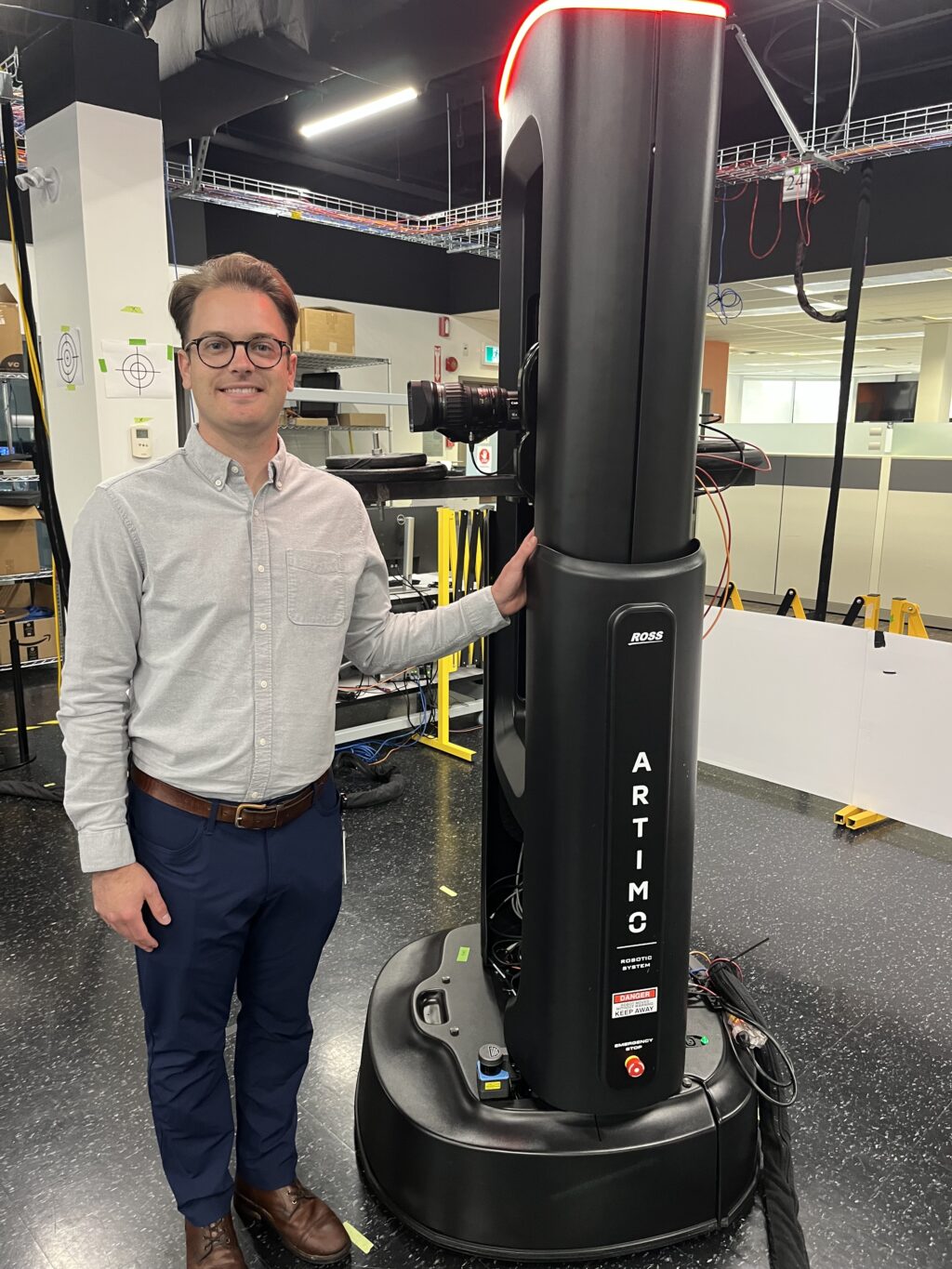Carleton Alum Leads Award-Winning Design for Ross Video
Alumni Spotlight on Nick Simpson (BID/19)
By Lara Danielle Vronick
By: Lara Vronick
When Nick Simpson (BID/19) graduated from Carleton in 2019 with a degree in Industrial Design, like so many new graduates at the time, pandemic-related cutbacks created uncertainty in his early career. Looking back, he views that experience as the catalyst that prepared him to lead an award-winning design project with Ross Video.
“My path was definitely not linear. I graduated in 2019 and then in 2020 I was laid off due to the pandemic,” says Nick, “But, after that I got to work on a design for a COVID-19 disinfection robot and that gave me a lot of experience going forward.”
Now with Ross Video, Nick is lead designer for a project called Artimo, a robotic camera system that has transformed in-studio broadcast and production. Artimo launched publicly in April 2024 with positive attention and praise from video production customers around the world; live sports broadcasters, award shows, news outlets and more.
The design and function of the robotic camera and its ability to silently cruise around a studio allows it to capture different angles and unique shots in ways that traditional systems like jibs and dollies cannot — and remotely. Ross Video CEO, David Ross referred to Artimo as, “art in motion.”
These qualities are what won Artimo a 2025 Red Dot Award for product design.

“During the design phase, it became clear that we were working on something special,” says Nick. “A lot of the engineers, software developers and industrial as well as UX designers really pushed to meet the challenge that Ross (Video) was looking for a really innovative and new product.”
The Red Dot is an international design competition that acknowledges the best projects in concept, communication, or product. For those not in a design-focused field, receiving a Red Dot award is like winning a Nobel Prize; it’s not just about the idea, it’s about the potential benefit and change to the status quo.
“We wanted to set out and change how [the customer] views these robots. We wanted them to think of them not just as tools, but something that enhances their set design,” says Nick.
Through a holistic integrated partnership, Ross Video and Carleton University have collaborated to provide students with experiential learning opportunities with real-world challenges. The partnership also includes a research component on topics related to image stabilization for robotic camera systems, for example, like Artimo.
Over the three-year partnership, many Carleton students have completed their required practicum component with Ross Video.
Recent grad, Stefen Acepcion (BID/25), had the opportunity to work on the Artimo project as part of their Industrial Design co-op placement from May to December 2023.
“My co-op at Ross was industrial and UX design,” says Stefen, “But because my interests lied more with industrial design, and this particular genre of consumer electronics and robotics, I was able to tailor my focus more on that.
“One of the things that really stuck out,” he says, “Was that there are some aspects within the field that you just can’t replicate in a studio environment and as a result I’ve gained insight on a lot of aspects of being a stronger industrial designer.”
Other members of the Artimo project are also Carleton alumni, including those on the UX and industrial design teams as well as management and robotics teams.
“People are very important in the process. Having a good mentor or a good co-op [project] can really make a difference. I was able to grow and learn a lot of skills from this experience,” says Stefen.
Industrial Design at Carleton is regarded as a highly competitive program that has a history of producing exceptional talent and opportunities for future graduates and employers alike. While co-op and internships are sometimes viewed interchangeably, Carleton’s Industrial Design program has a mandatory practicum component, which students choose to satisfy through either a practice internship placement (minimum 12-weeks) or a university co-op (minimum five work terms typically spanning one year).
Nick also recalls the placement he did during his degree as being a valuable opportunity that prepared him to lead the award-winning design team.
“Carleton’s requirement to get real world experience before you can graduate probably had the most significant impact on my career,” says Nick.
Artimo was the only Red Dot product design winner submitted by a Canadian company in the category of robotics and one of just three from North America.
Alumni Spotlight Video
Learn more about Nick’s journey as an industrial designer, from late nights in Carleton’s design studios to creating Artimo and winning a Red Dot award: